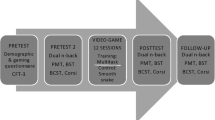Abstract
This study aimed to investigate whether commercial games can serve as a tool for assessment of intelligence: for good proxies of intelligence without having the problems of test salience. One hundred and twelve participants completed a standardised intelligence test along with one spatial and one verbal game to determine the relationship between cognitive ability and game performance. Both games were significant correlates of intelligence, though differences were found in the strength of correlations and contribution of other factors between the two tasks. Implications and remaining questions regarding the potential value of such games in practical settings are discussed.
Similar content being viewed by others
References
Adams, D. M., & Mayer, R. E. (2014). Cognitive consequences approach: What is learned from playing a game. In R. E. Mayer (Ed.), Computer games for learning: An evidence-based approach (pp. 171–224). Cambridge, MA: MIT Press.
Boot, W. R. (Ed.). (2015). Video games as tools to achieve insight into cognitive processes. Frontiers Media SA.
Carroll, J. B. (1997). The three-stratum theory of cognitive abilities. In D. P. Flanagan, J. L. Genshaft, & P. L. Harrison (Eds.), Contemporary intellectual assessment: Theories, tests, and issues (pp. 122–130). New York: Guilford Press.
Deary, I. (2001). Intelligence: A very short introduction. Oxford: Oxford University Press.
Engle, R. W., Tuholski, S. W., Laughlin, J. E., & Conway, A. R. (1999). Working memory, short-term memory, and general fluid intelligence: A latent-variable approach. Journal of Experimental Psychology: General, 128(3), 309.
Foroughi, C., Serraino, C., Parasuraman, R., & Boehm-Davis, D. (2016). Can we create a measure of fluid intelligence using Puzzle Creator within Portal 2? Intelligence, 56, 58–64.
Furnham, A. (2008). Personality and intelligence at work. London: Routledge.
Furnham, A. (2010). Proofreading as an index of crystallised intelligence. Educational Psychology, 30(6), 735–754.
Garris, R., Ahlers, R., & Driskell, J. E. (2002). Games, motivation, and learning: A research and practice model. Simulation & Gaming, 33(4), 441–467.
Gnambs, T., & Appel, M. (2017). Is computer gaming associated with cognitive abilities? Intelligence, 61, 19–28.
Gottfredson, L. S. (1997). Why g matters: The complexity of everyday life. Intelligence, 24(1), 79–132.
Granic, I., Lobel, A., & Engels, R. C. (2014). The benefits of playing video games. American Psychologist, 69(1), 66.
Griffiths, M. (1997). Video games and clinical practice: Issues, uses and treatments. British Journal of Clinical Psychology, 36(4), 639–642.
Hansen, W. A., & Goldinger, S. D. (2009). Taboo: Working memory and mental control in an interactive task. American Journal of Psychology, 122(3), 283.
Hoffman, B., & Nadelson, L. (2010). Motivational engagement and video gaming: A mixed methods study. Educational Technology Research and Development, 58(3), 245–270.
Ihsan, Z., & Furnham, A. (2018, in press). The new technologies in personality assessment: A review. Consulting Psychology.
Mané, A., & Donchin, E. (1989). The space fortress game. Acta Psychologica, 71(1–3), 17–22.
Moutafi, J., Furnham, A., & Tsaousis, I. (2006). Is the relationship between intelligence and trait Neuroticism mediated by test anxiety? Personality and Individual Differences, 40(3), 587–597.
Quiroga, M. Á., Escorial, S., Román, F. J., Morillo, D., Jarabo, A., Privado, J., et al. (2015). Can we reliably measure the general factor of intelligence (g) through commercial video games? Yes, we can! Intelligence, 53, 1–7.
Raven, J. C., & Court, J. H. (1998). Raven’s progressive matrices and vocabulary scales. Oxford: Oxford Psychologists Press.
Ritchie, S. (2015). Intelligence: All that matters. London: Hodder and Stoughton.
Sajjadi, P., Vlieghe, J., & De Troyer, O. (2017). Exploring the relation between the theory of multiple intelligences and games for the purpose of player-centred game design. Electronic Journal of e-Learning, 15(4), 320–334.
Spitz, H. (1978). The universal nature of human intelligence: Evidence from games. Intelligence, 2, 371–379.
Valve Corporation. (2007). Introduction Video for Portal. Retrieved November 15, 2016, from http://cdn.edgecast.steamstatic.com/steam/apps/922/movie480.webm?t=1447350865.
Vorderer, P., Hartmann, T., & Klimmt, C. (2003). Explaining the enjoyment of playing video games: The role of competition. In Proceedings of the Second International Conference on Entertainment Computing (pp. 1–9). Carnegie Mellon University.
Author information
Authors and Affiliations
Corresponding author
Ethics declarations
Conflict of interest
None.
About this article
Cite this article
Lim, J., Furnham, A. Can Commercial Games Function as Intelligence Tests? A Pilot Study. Comput Game J 7, 27–37 (2018). https://doi.org/10.1007/s40869-018-0053-z
Received:
Accepted:
Published:
Issue Date:
DOI: https://doi.org/10.1007/s40869-018-0053-z




